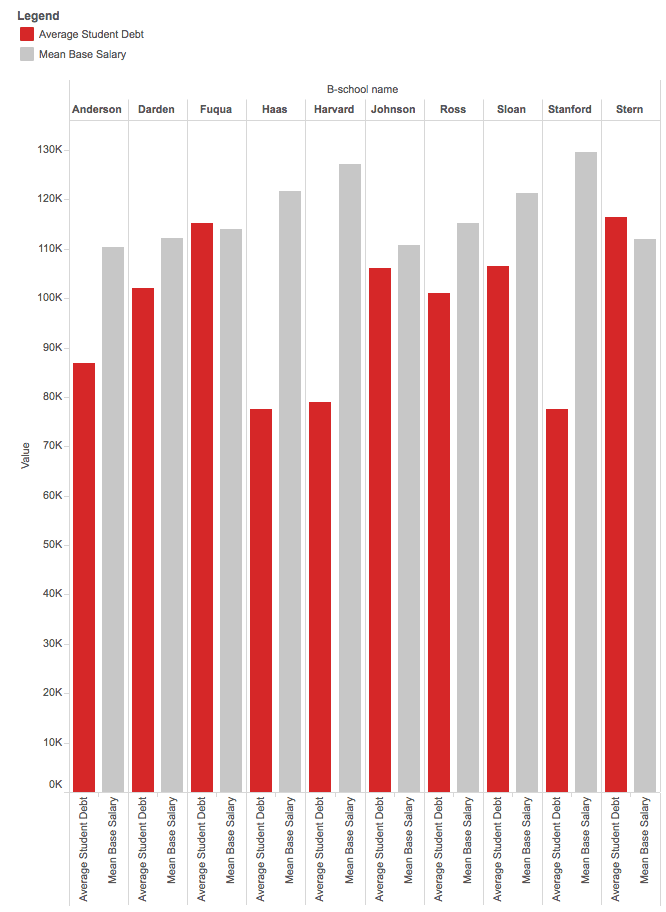Weighing the Costs and Benefits of an MBA

At one point or another, almost every business professional asks the question, “Should I get an MBA?”
It’s a valid question. Standing out in a crowd of businessmen isn’t always easy. An MBA can give you a leg up against the competition and help you land the job of your dreams; at least that’s the claim.
But does it really work? Is an MBA worth the time, cost, and effort required? The question is simple, but the answer can be complicated.
Should You Get an MBA?
Every individual has to perform his or her own cost-benefit analysis when it comes to earning an advanced degree or certificate. The truth of the matter is that there is no cut and dried answer that fits every scenario. Most MBA graduates would probably say that the cost and time they put into getting their MBA was well spent, but it depends on your goals and expectations.
Before we dive down into the benefits of getting an MBA, it’s important to look at some of the harsh truths.
-
There Are a lot of MBAs
Fifteen to twenty years ago, having an MBA put you in the top one percent of the population. Now, it’s a different story. According to the 2015 United States Census Bureau, 12% of the U.S. population 25 years and older holds an advanced degree; that’s approximately 153,573 individuals. Unfortunately, when supply increases prices go down, and if the supply overwhelms demand, then you’re left with MBA graduates who can’t find jobs or demand the salaries they deserve.
-
An MBA Is Expensive
“Education is always great. There is no downside, except for the debt and that can be a big deal,” said Kim Finch Cook, an Executive Recruiter with 25 years of experience. In fact, debt can be a huge deal. According to the U.S. News, a typical MBA student walks away from their MBA program with just over $50,000 in debt. Unfortunately, for many individuals, the MBA salary can’t keep up. In fact, at many of the top MBA programs, average student debt and average student salary were equal, or the debt-to-salary ratio was skewed toward debt. Imagine getting an MBA and then moving on to a job that can barely afford to pay for your student loans.
-
An MBA Has Diminishing Returns
An MBA is always valuable, but its return on investment (ROI) diminishes over time. After you’ve been in the workforce for ten to fifteen years, companies are more worried about work experience compared to education.
“I think that upfront, during your first two to five years of work, the MBA really does make a difference in obtaining a higher salary and being chosen over another candidate,” said Kim. “After that, the MBA doesn’t diminish, but it’s not as important because it’s all about your work history.”
After a while, an MBA won’t hold the same weight or have the same positive impact on your career. In fact, you might even find yourself fighting against other executives who have slightly more work experience because they didn’t take the two years necessary to obtain their MBA. Not to mention the fact that an MBA can set you back three to five years worth of savings, or $54,000 to $90,000.
-
An MBA Can’t Overcome Every Obstacle
An MBA offers a broad set of skills and knowledge, but the harsh truth is that most MBA graduates will lose most of what they learned within two years. So, unless you continue to enhance your education, your MBA will become background knowledge to what you learn on the job. That’s why Kim prefers an MBA with a concentration. A concentration lets you focus your skill set so that it becomes more valuable. However, it still can’t overcome a lack of experience.
“Part of selling the MBA is understanding what you did because you’re going to be asked, ‘What was your concentration? What was your focus? What was your case study?’” shared Kim. “However, you need to remember that education is just a leg up. It’s a little bit extra. It will not a make or break your career. At the C-level, companies focus most on work experience. An MBA may be a small plus, but that’s when you really have to weigh out the cost, time, and effort of the MBA versus time on the job. At some points, it will almost be equal. But no matter what, an MBA is still going to be impressive.”
-
MBAs Can Be Overqualified
During downturns in the economy, it can be tough for an individual with an MBA to find a job. That’s because when companies don’t have a lot of money to spend, they can’t afford to hire an MBA. “The only time an MBA is a negative is when they’re overqualified. They can’t find a job because they have too much education,” said Kim. “However, MBAs have to ask the question, ‘Do I really want that job if I’m overqualified?’ Don’t undersell yourself. You have an MBA.”
The Benefits of an MBA
Okay, now that the negatives have been laid on the table, let’s look at why you should get an MBA? A 2012 report from the Graduate Management Admission Council revealed a few key facts:
- 93% of the 2011 MBA alumni revealed that they were employed at the job they wanted.
- Four out of five MBA graduates (82%) revealed that their salary met or exceeded their expectations.
The simple fact is that most MBA graduates are satisfied with their decision to get an advanced business degree. So, what are the benefits to obtaining an MBA?
-
An MBA Is Beneficial To Every Industry
An MBA holds value in almost every industry and at every level. “I almost always look for an MBA in an applicant,” revealed Kim. “Across the board, an MBA is beneficial in every industry. If you’re into Finance, you want an MBA. If you’re into technology or even software development, I look for an MBA.”
No matter the industry, an MBA reveals a few key facts about the individual. It demonstrates dedication, pride, determination, leadership, management, and more. The variety of skills that an MBA develops can be attributed to any industry for a more attractive job candidate. According to GMAC, 88% of corporate recruiters planned to hire recent MBA graduates in 2016.
-
MBA Graduates Earn Higher Pay
U.S.-based companies plan to offer MBA graduates a starting median base salary of $105,000 in 2016. In comparison, a business professional with only a bachelor’s degree can expect an average salary of $52,236. Of course, that’s only at the beginning. Over a lifetime, an individual with an MBA can expect to earn almost $1.4 million more than someone with a bachelor’s degree. The salary payoff of an advanced degree can be huge.
-
MBAs Get Executive Positions
“I see a lot of executives who’ve had to go back to get their MBA and take one to two years off because they knew they had to have an MBA to get where they wanted to go,” said Kim. “Not having an MBA was holding them back. I’ve particularly seen it in Finance, where an executive wants to be a CFO, and they need an MBA.”
The reality is that without an MBA, you may not be able to get the job you want. The Harvard Business Review revealed that approximately 65% of leaders in Fortune 100 companies hold a graduate degree. And at companies like Sears (75%), Sunco (70%), and Disney (63%) a majority of those leaders have an MBA.
-
MBAs Have a Substantial Network
The phrase “it’s not what you know but who you know” was made for MBAs. Graduates of MBA programs gain access to a very small but exceptional network of individuals. These individuals, including alumni and professors, can be invaluable for future job hunts, promotions, and even investments. The truth is that MBAs gravitate toward other MBAs, and so if you’re a part of that elite community, you can have access that is denied to those without a degree.
-
The MBA Opens Global Opportunities
Nearly 30% of companies that plan to hire MBA graduates in 2016 will place those candidates in multiple world regions. MBAs are much better prepared for working in a global market, and that’s for many reasons. Many of the top business schools have classes made up of about 50% international students, which makes for a global learning environment. On top of that, some of the best MBA programs, such as Columbia Business School, include an oversees trip for direct international exposure.
Getting the Most Value Out of Your MBA
The key to making sure that your MBA is worth it is how you tackle it. There are a few key things that you can do to make sure you receive the most value possible.
- Include Sales Experience: “When I look at an executive, one of the things that most great CEOs have is a background in sales,” said Kim. “Having an MBA and sales experience is a good thing. Sales means you can talk to people. The wave of the future is product development, so having the ability to go into a pharmaceutical or product development company with sales experience is a big deal.”
- Attend a Top-Tier School: “Ivy League still carries a lot of weight,” revealed Kim. “You’re second and third tier universities don’t carry the same weight. It can make a big difference where you attend. Some employers can actually discredit MBAs from lower tier schools, and that’s a shame.”
- Get a Good GPA: “Companies like Amazon want to know GPA. They don’t look at anything under a 3.5. So a high GPA makes a difference,” said Kim. “So, if you have over a 3.5 GPA, put it on your resume. It makes a difference for the Fortune 100 companies.”
- Get an Internship: “I want to know everything that an MBA did to get work experience,” explained Kim. “Even if you were a file clerk for a legal company doing grunt work, it’s still great exposure. If a candidate can possibly get an internship within the industry they’re interested in, that’s fantastic.”
- Don’t Sell Yourself Short: “I find that some entry level candidates with an MBA, tend to take whatever they can get,” Kim described. “But I remind them, ‘You have an undergrad and an MBA. You are a great candidate.’ Sometimes they don’t realize how great they are. Sometimes they don’t realize how valuable they are. Companies want MBAs.”
